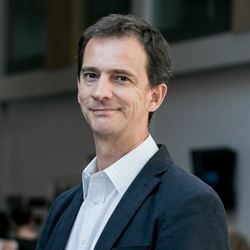
by Richard Bolden
Professor, Leadership and Management, University of the West of England, UK
17 June 2020
Share:
The killing of George Floyd by a police officer in Minneapolis, USA on 25th May 2020 triggered a wave of protests about racial inequality that have spread around the world. In my home city of Bristol, UK, the Black Lives Matter march on 7th June led to the toppling of the statue of Edward Colston, a 17th-century slave trader whose sculpture had stood in pride of place in the city centre for 125 years.
Colston, who was born in Bristol in 1636, made his fortune as a merchant – initially trading wine, fruits, and cloth before becoming involved in the slave trade. From 1680-1692 he worked for the Royal Africa Company, during which time some 84,000 Africans were transported into slavery, with around 19,000 perishing in the process.1 Despite his involvement in this abhorrent trade, Colston was widely celebrated for endowing significant sums of money to local schools, hospitals, alms-houses, and churches. His statue was erected in 1895 and his name still features on many city landmarks.
The actions of the protesters that day drew a range of reactions. Whilst the Home Secretary, Priti Patel, described it as “utterly disgraceful” and the Prime Minister, Boris Johnson, called it a “criminal act”‘ others took a more nuanced approach. Marvin Rees, the elected Mayor of Bristol, whilst not condoning the wilful damage of public property said the statue had been a “personal affront” to him and many other people for years and that he “did not feel any sense of loss.”2 In televised interviews later that day Rees, the first elected mayor of Afro-Caribbean descent in Europe, laid-out the complexities of the context in which it had occurred – highlighting the challenges and the need for an open and honest debate about the history of race and inequality in the city.
Whilst some expressed outrage that the statue was pulled down Professor David Olusoga pointed out that the real question was why “21st-century Bristol still had a statue of a slave trader on public display” in the first place.3 To those who suggested that removing Colston’s statue was an attempt to erase the city’s past, he responded “the toppling of Edward Colston’s statue is not an attack on history – it is history.”
The speed with which other cities across the country have responded by reviewing and removing statues that fail to reflect the multi-cultural nature of contemporary Britain shows that these thoughts are finally being heard.4 The history of colonisation and slavery that fuelled Britain’s economic, cultural, and political influence for many centuries has become woven into the fabric of our institutions and society leaving many of us blind to the day-to-day racism and inequality it perpetuates.
To those who suggested that removing Colston's statue was an attempt to erase the city's past, he responded "the toppling of Edward Colston's statue is not an attack on history - it is history."
The events of the past few weeks have a great deal to tell us about the nature and purpose of good leadership in contemporary society. Firstly, they demonstrate that in the second decade of the 21st Century, we are still far from the “post-racial” society that some may claim. The roots of racism go back many years and will no doubt take many more to rectify. The diversity of our workforce and communities is widely acknowledged as a significant source of creativity, innovation, and competitive advantage yet the relatively superficial attempts to tackle unconscious bias within organisations barely scratches the surface of the discrimination experienced by Black, Asian and Minority Ethnic (BAME) individuals on a daily basis. The role of leaders in a progressive, multi-cultural society is to actively foster and promote diversity in all its forms and to dismantle systems, structures, and processes that “inhibit the full and equal engagement of all individuals.”5 This is difficult and demanding work that requires significant time and emotional investment. It requires listening to and learning from the lived experience of others, and to actively champion and support marginalised individuals and groups.
Secondly it shows the need for a deep appreciation of context, informed by genuine respect for the plurality of perspectives on any particular issue. The Police Superintendent for Bristol, Andy Bennett, noted that whilst his officers were present when the statue of Colston was toppled, a decision was taken not to intervene as doing so was likely to lead to further disorder. In explaining this decision, he said “whilst I’m disappointed people would damage one of our statues, I do understand why it has happened, it is very symbolic.”6 Bennett, like Rees, demonstrated a nuanced understanding of the issues and the potential for unintended consequences from his actions. It is also highly likely that he considered the wider context of criminal justice within the city and the long-term effects of heavy-handed policing in a situation such as this.
And thirdly it demonstrates the importance of genuine, open discussion in mobilising and sustaining social change. Both Rees and Bennett’s response to the incidents in Bristol on 7th June show a real awareness of the importance of shifting the narrative from blame to reconciliation. The day after the protest, Bristol City Council announced its intent to create a new exhibition at the city’s M Shed Museum featuring placards and banners from the march, most likely alongside the despoiled statue of Edward Colston once retrieved from the harbour. A day later, Rees announced the launch of a new commission to document and share the “true history” of Bristol.7
Recognition of the disproportionate impact of the Coronavirus pandemic on BAME communities – both in health and economic terms – alongside a growing sense that not enough is being done to address this is, of course, another key part of the backdrop to recent events.8 Following the suffering and disruption caused by COVID-19 and the trauma of George Floyd’s death, however, there is a glimmer of hope. Back in April, Rees argued that the post-COVID recovery in Bristol should focus on building a “more sustainable, more inclusive, more fair and more just” economy and had begun rallying support for this across the city.9 Indeed, the groundwork for such an approach had already been laid through the development of the One City Approach10 and the launch of the One City Plan in January 2019. The three aspects of inclusive place-based leadership outlined above – allyship, understanding, and dialogue – will undoubtedly form the bedrock of Bristol’s recovery plan as it emerges from lockdown into a post-COVID world, hopefully building a stronger sense of shared purpose and commitment to learning from our past and moving forward in a caring and considered way.
Note: this is an edited version of a story first posted on the Bristol Leadership and Change Centre blog – https://blogs.uwe.ac.uk/leadership-and-change/the-fall-of-edward-colston-and-the-rise-of-inclusive-place-based-leadership/
References
1https://en.wikipedia.org/wiki/Edward_Colston
2https://www.independent.co.uk/news/uk/politics/bristol-mayor-edward-colston-statue-black-lives-matter-protest-marvin-rees-a9554646.html
3https://www.theguardian.com/commentisfree/2020/jun/08/edward-colston-statue-history-slave-trader-bristol-protest
4https://www.theguardian.com/world/live/2020/jun/09/uk-protests-black-lives-matter-colston-statue-rhodes-live
5https://uwe-repository.worktribe.com/output/852067
6https://www.bristolpost.co.uk/news/bristol-news/right-wing-people-came-down-4205570
7https://news.bristol.gov.uk/news/bristols-real-story-must-be-told
8https://www.theguardian.com/politics/2020/jun/06/labour-accuses-government-of-cover-up-over-bame-covid-19-report
9https://www.bristol247.com/news-and-features/news/rees-lets-rebuild-a-fairer-inclusive-and-more-sustainable-economy/
10https://www.bristolonecity.com

Richard Bolden is Professor of Leadership and Management at Bristol Business School, University of the West of England. His teaching and research explore the interface between individual and collective approaches to leadership and leadership development. He has published on topics including distributed, shared and systems leadership; leadership paradoxes and complexity; cross-cultural leadership; and leadership and change in healthcare and higher education. He is Director of Bristol Leadership and Change Centre and Associate Editor of the journal Leadership. Richard is a member of the ILA.

